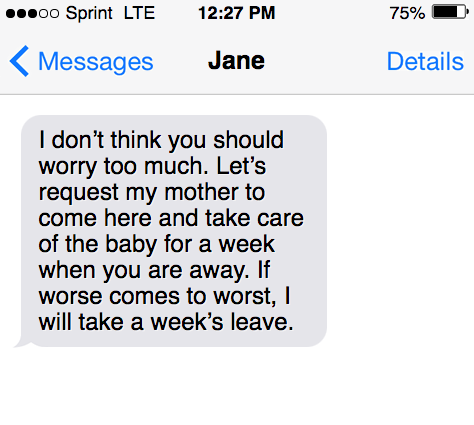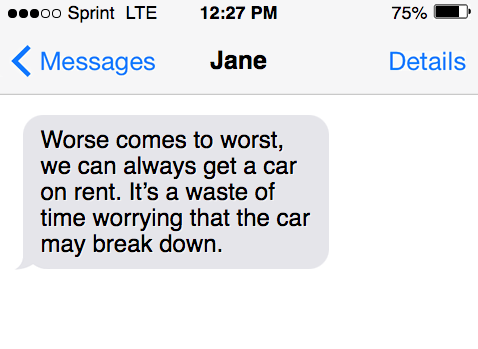What does “imitation is the sincerest form of flattery” mean? And why is it a common expression in American English? Is it a good or negative thing?
Learn more about this idiom…
What does “worse come to worst” mean?
Worse signifies something bad. Worst signifies something terrible. Worse come to worst indicates that the bad situation is going to turn into something even worse. It signifies that an unpleasant situation is on, and things are going to turn into something that could be catastrophic.
The idiom is used to signify a situation that is expected to turn from worse to worst. While worse is comparative, worst is superlative. It is used to signify a worst-case scenario. This is one of the common idioms that are used while talking about something negative going to happen.
While worse coming to worst is the common usage, some people even use it as worst to worst. This is an exaggeration where the speaker is trying to suggest that the situation is already at its worst and going to even extreme levels. Both uses are correct and signify the worst possibility that could occur.

Is it “worst comes to worst” or “worse comes to worst”?
To answer this question, we need to go to the origin of this idiom. It is believed that Thomas Nashe can be credited with having used this idiom first. He made a comparison between dying by drowning to dying burnt in a fire. While comparing, he said that “worst comes to worst, if the swimmer is good, he may be able to do something.”
The first use of this idiom was thus “worst comes to worst.” Later on, the idiom was used in the works of other greats like Dickens, Dryden, and Bronte. So, the original is worst comes to worst. But as you can see, worse to worst seems a better use. The question is, how did this originate?
Crediting Daniel Defoe
The credit goes to author Daniel Defoe’s classic ‘Robinson Crusoe’. He used worse-worst for the first time. Soon, it became popular. When we use worst and worst, we are progressing from the comparative to the superlative. This is logical and seems a better usage. This is the reason worse comes to worst is prevalent.
Both of these can be used and have been used. However, the worse-worst seems better suited, which is why it is more in use. Even if worst-worse is used, it is fine but the worst-worst sounds better.
In fact, of late, worse-worst is being used by some people. The saying has been modified to “if worse comes to worse.” This is a twenty-first century use of this idiom that some people prefer.

Is it correct to use?
Any of these are perfectly fine to use and would not be incorrect. However, “worse comes to worst” is the most common use of this idiom. Sentences seem to be better as well and sounds better with this usage.
Examples of “worse comes to worst” used in sentences
The examples explain how you can use “worse comes to worst” in the right way:
- If the worse comes to worst, he can quit his job and start a business from home.
- The Mayor had agreed to be the Chief Guest, but I fear she may not turn up for the event. If worse comes to worst, we can always request our local councilor to fill in.
- I don’t think you should worry too much. Let’s request my mother to come here and take care of the baby for a week when you are away. If worse comes to worst, I will take a week’s leave.
- Don’t worry that extra guests may turn up. If worse comes to worst, we can borrow furniture from Mrs. Smith. She has a lot of extra furniture.
- Worse comes to worst; we can always get a car on rent. It’s a waste of time worrying that the car may break down.
- If worse comes to worst, we can always sell car and use public transport. We can both take up extra part-time work to make ends meet.
Synonyms of “worse comes to worst”
There are many other phrases that have a similar meaning of “worse comes to worst”. Some of these synonyms include:
- If the worst happens.
- If a worst-case situation emerges.
- In a worst-case scenario.
- If the worst should happen.
- At its worst.
- At their worst.
- When the worst thing happens.
How to say “if worst comes to worst” correctly?
As seen above, “if worse comes to worst” is a better and more logical way of expressing the saying “if worst comes to worst.” You can say this idiom by pronouncing it in the right way. The saying can be pronounced right as follows if-wurst-kuhmz-too-wurst.
Sources
- On Language – “If Worst Comes to Worst” – The New York Times
- If Worse Comes To Worst synonyms – 27 Words … – Power Thesaurus
- Idiom: If worst comes to worst (meaning & examples)
- How to Use Worse comes to worst Correctly – Grammarist
- IF WORSE/WORST COMES TO WORST – Cambridge Dictionary
Inside this article
Fact checked:
Content is rigorously reviewed by a team of qualified and experienced fact checkers. Fact checkers review articles for factual accuracy, relevance, and timeliness. Learn more.
Core lessons
Glossary
- Abstract Noun
- Accusative Case
- Anecdote
- Antonym
- Active Sentence
- Adverb
- Adjective
- Allegory
- Alliteration
- Adjective Clause
- Adjective Phrase
- Ampersand
- Anastrophe
- Adverbial Clause
- Appositive Phrase
- Clause
- Compound Adjective
- Complex Sentence
- Compound Words
- Compound Predicate
- Common Noun
- Comparative Adjective
- Comparative and Superlative
- Compound Noun
- Compound Subject
- Compound Sentence
- Copular Verb
- Collective Noun
- Colloquialism
- Conciseness
- Consonance
- Conditional
- Concrete Noun
- Conjunction
- Conjugation
- Conditional Sentence
- Comma Splice
- Correlative Conjunction
- Coordinating Conjunction
- Coordinate Adjective
- Cumulative Adjective
- Dative Case
- Determiner
- Declarative Sentence
- Declarative Statement
- Direct Object Pronoun
- Direct Object
- Diction
- Diphthong
- Dangling Modifier
- Demonstrative Pronoun
- Demonstrative Adjective
- Direct Characterization
- Definite Article
- Doublespeak
- False Dilemma Fallacy
- Future Perfect Progressive
- Future Simple
- Future Perfect Continuous
- Future Perfect
- First Conditional
- Irregular Adjective
- Irregular Verb
- Imperative Sentence
- Indefinite Article
- Intransitive Verb
- Introductory Phrase
- Indefinite Pronoun
- Indirect Characterization
- Interrogative Sentence
- Intensive Pronoun
- Inanimate Object
- Indefinite Tense
- Infinitive Phrase
- Interjection
- Intensifier
- Infinitive
- Indicative Mood
- Participle
- Parallelism
- Prepositional Phrase
- Past Simple Tense
- Past Continuous Tense
- Past Perfect Tense
- Past Progressive Tense
- Present Simple Tense
- Present Perfect Tense
- Personal Pronoun
- Personification
- Persuasive Writing
- Parallel Structure
- Phrasal Verb
- Predicate Adjective
- Predicate Nominative
- Phonetic Language
- Plural Noun
- Punctuation
- Punctuation Marks
- Preposition
- Preposition of Place
- Parts of Speech
- Possessive Adjective
- Possessive Determiner
- Possessive Case
- Possessive Noun
- Proper Adjective
- Proper Noun
- Present Participle
- Prefix
- Predicate



